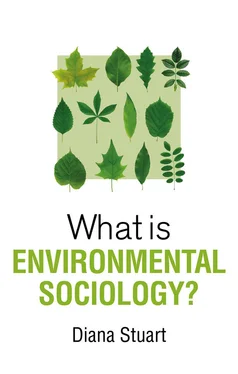Calling these threats “existential” may sound extreme or exaggerated, but unfortunately it is not. We face unprecedented global environmental impacts putting our existence at risk. In recent reports from the Intergovernmental Panel on Climate Change (IPCC 2018) and the Intergovernmental Science-Policy Platform on Biodiversity and Ecosystem Services (IPBES 2019), scientists have illustrated the severity of both the climate and biodiversity crises and how current trajectories put us at risk of societal collapse, massive population loss, and even possible extinction. These reports call for rapid and unprecedented changes in all aspects of society to address these crises and minimize ecological and social impacts. The climate and biodiversity crises together pose a global existential threat to the human race. While these two distinct crises are discussed here, they will sometimes be grouped together and referred to as “the environmental crisis” or “existential threats” throughout the book.
With only about a 1.1° Celsius (C) average global temperature increase thus far, we are already seeing serious impacts due to global climate change, including unprecedented fires, floods, and hurricanes; and much more severe impacts are projected as warming continues. The words “crisis” and “emergency” are increasingly used by scientists and in the media to describe climate change. Steffen and colleagues (2018) explain the very real possibility of reaching a critical threshold of warming, a global tipping point, after which additional warming would be uncontrollable, resulting in a “Hothouse Earth” scenario. In Nature , Lenton and colleagues (2019: 595) state that climate change “is an existential threat to civilization,” explaining that “the evidence from tipping points alone suggests that we are in a state of planetary emergency.” Finally, Ripple and colleagues (2019: 1), representing the Alliance of World Scientists, identify “disturbing” and “worrisome” vital signs that they state “clearly and unequivocally” illustrate we are in a “climate emergency.” Klinenberg et al. (2020: 664) and other sociologists argue that climate change needs to be a central focus in all subdisciplines of sociology, as it is rapidly transforming the conditions of life on the planet for all people and “everything is at stake.”
Although the climate crisis contributes to biodiversity loss, the biodiversity crisis is considered a separate yet related crisis. Biodiversity loss receives much less public attention than climate change, yet it too poses an existential threat to humans. Imagine the impacts on humans if extinction cascades resulted in the loss of insect pollination or the loss of all ocean life. This is why terms like “ecological crisis” and “biodiversity crisis” are now commonly used by scientists and in the media. For example, a letter representing almost 100 scientists was published in October of 2018 titled: “Facts about our ecological crisis are incontrovertible” (Green and Scott Cato 2018). A year later, the United Nations report on biodiversity and ecosystem services (IPBES 2019) resulted in scientists publicly calling for rapid funding and intervention to address the “biodiversity crisis” (Malcom et al. 2019). The IPBES media release (2019) states that species loss has accelerated to rates that “constitute a direct threat to human well-being in all regions of the world.” The climate and biodiversity crises can both be seen as “crises of civilization” that together represent an unprecedented existential threat.
The climate and biodiversity crises are related, as climate change increases extinction rates, but they are also related in how the impacts of these crises are unfolding, who is most affected, the underlying drivers, and the likely solutions. Environmental sociology can play a critical role in understanding these impacts, drivers, and solutions. Already, environmental sociologists are working to identify unequal and unjust impacts, root drivers of impacts that are overlooked by oversimplified diagnoses, the ineffectiveness and inadequacy of proposed solutions, and the extent of social transformation necessary to stave off these existential threats. While this book will draw from examples beyond these global crises, it will emphasize how current and future environmental sociologists can contribute to understanding and addressing these escalating threats. We are in uncharted waters, and environmental sociologists can play an important role identifying and advocating for the most effective and just paths forward.
While crises create uncertain and daunting times, they also can create opportunities for change that can be positive. Having plans for positive social transformation already formulated is critical for being prepared to direct the path of change. It is those who have studied and who understand the impacts and drivers of problems who can point us in the direction of effective and just solutions. Conditions can rapidly change due to environmental, economic, and health crises (e.g., the Covid-19 pandemic) and ideas that were previously deemed unfeasible can suddenly gain popular support. As windows open for positive social change, environmental sociologists can play a key role in identifying effective solutions and helping to steer society toward paths that increase social and ecological well-being. This important work requires a thorough understanding of the complex relationships between nature and society.
Navigating Nature and Society
Navigating the study of nature and society is a relatively recent endeavor, due to philosophical and scientific paradigms that remained dominant for hundreds of years. The Enlightenment period, between the seventeenth and nineteenth centuries, was also called the Age of Reason, as scholars emphasized how humans can use their unique intellectual abilities to control and dominate nature for social progress. Nature was regarded as separate from and subordinate to humans, reinforcing the notion of human exceptionalism. This rationality also influenced the development of the sciences into distinctive and isolated disciplines for examining the social and natural worlds. Sociology developed specifically as a science of society, using social facts to explain social phenomena. Yet, as with many other disciplines, over time scholars increasingly realized that separating nature and society was a false and dangerous depiction of the world.
Environmental sociology emerged in the 1970s as a result of calls for new theories and methods that cast away Enlightenment notions of society as separate from nature, offering a more holistic (and realistic) understanding of the world. In a series of articles, Dunlap and Catton convincingly argued for a new kind of sociology involving a paradigmatic and methodological shift away from a solely anthropogenic focus (Catton and Dunlap 1978a, 1978b, 1980; Dunlap and Catton 1979, 1983). They called for a purposeful move away from the dominant human exceptionalism perspective in sociology toward one that incorporates ecological entities and processes. It has been over forty years since these articles were published, and a diverse body of scholarship has emerged in environmental sociology.
It is important to know that sociology was not the only or first discipline to breach the nature-society divide. Human geographers were examining the relationships between people, place, and the environment long before environmental sociology existed. Anthropologists were also examining how people lived and related to their surroundings. In addition, human ecology, a subfield related to multiple disciplines, focused on relationships between humans and the biophysical world. In the past few decades, new areas of study have also emerged that cross the nature-society divide. Political ecology, a subdiscipline in geography, examines nature-society relations, focusing on power, marginalization, and political economy. Ecologists have also developed approaches to study the resilience of social-ecological systems. In summary, as the nature-society divide has been increasingly deemed false, scholars in a range of disciplines have developed new theories and approaches to examine nature and society together.
Читать дальше












